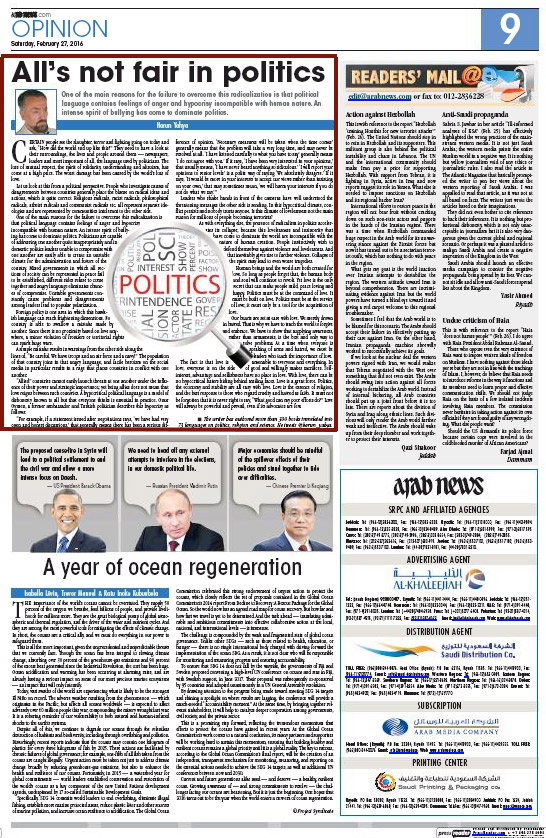
Certain people see the slaughter, terror and fighting going on today and ask, “How did the world end up like this?” They need to have a look at their surroundings, the lives and people around them — newspapers, leaders and most important of all, the language used by politicians. The loss of mutual respect, the spirit of solidarity, understanding and altruism, has come at a high price. The worst damage has been caused by the world’s loss of love.
Let us look at this from a political perspective. People who investigate causes of disagreements between countries generally place the blame on radical ideas and actions, which is quite correct. Religious radicals, racist radicals, philosophical radicals, atheist radicals and communist radicals etc. all represent separate ideologies and are represented by communities intolerant to the other side.
One of the main reasons for the failure to overcome this radicalization is that political language contains feelings of anger and hypocrisy incompatible with human nature. An intense spirit of bullying has come to dominate politics. Politicians are capable of addressing one another quite inappropriately and in domestic politics leaders unable to compromise with one another are easily able to create an unstable climate for the administration and future of the country. Mixed governments in which all sections of society can be represented in peace fail to be established, different sides refuse to come together and angry language eliminates chances of compromise. Unstable governments constantly cause problems and disagreements among leaders lead to popular polarization.
Foreign policy is one area in which this hawkish language can reach frightening dimensions. No country is able to swallow a mistake made by another. Since there is no proximity based on love anywhere, a minor violation of frontiers or territorial rights can spark huge wars.
A simple mistake results in warnings from the other side along the lines of, “Be careful. We have troops and an air force and a navy!” The population of that country joins in that angry language, and facile heroism on the social media in particular results in a rage that places countries in conflict with one another.
“Allied” countries cannot easily launch threats at one another under the influence of their power and strategic importance; yet being allies does not mean that love reigns between such countries. A hypocritical political language is a model of dishonesty known to all but that everyone thinks is essential in practice. Onur Oymen, a former ambassador and Turkish politician describes this hypocrisy as follows:
“For example, if a statement issued after negotiations says, ‘we have had very open and honest discussions,’ that generally means there has been a serious difference of opinion. ‘Necessary measures will be taken when the time comes’ generally means that the problem will take a very long time, and may never be resolved at all. ‘I have listened carefully to what you have to say’ generally means ‘I do not agree with you.’ If it says, ‘I have been very interested in your opinions,’ that usually means, ‘I have never heard anything so ridiculous.’ ‘I will report your opinions to senior levels’ is a polite way of saying ‘We absolutely disagree.’ If it says, ‘It would be more in your interests to accept our views rather than insisting on your own,’ that may sometimes mean, ‘we will harm your interests if you do not do what we say.’”
Leaders who shake hands in front of the cameras have well understood the threatening messages the other side is sending. In this hypocritical climate, conflict persists and nobody trusts anyone. Is this climate of lovelessness not the main reason for millions of people becoming terrorists?
As with everything else, the presence of radicalism in politics accelerates its collapse; because this lovelessness and insincerity that have come to dominate the world are incompatible with the nature of human creation. People instinctively wish to defend themselves against violence and lovelessness. And that inevitably gives rise to further violence. Collapse of the spirit may lead to even worse tragedies.
Human beings and the world are both created for love. So long as people forget that, the human body and soul will continue to revolt. Yet love is the only secret that can make people mild, peace loving and happy. Politics must be at the command of love. It must be built on love. Politics must be at the service of love; it must only be a tool for the acquisition of love.
Our hearts are set at ease with love. We merely drown in hatred. That is why we have to teach the world to forgive and embrace. We have to show that supplying awareness, rather than armaments, is the best and only way to solve problems. At a time when everyone is speaking of arms and hatred, we must be leaders who teach the importance of love.
The fact is that love is amenable to everyone and everything. In love, everyone is on the side of good and willingly makes sacrifices. Self-interest, advantage and selfishness have no place in love. With love, there can be no hypocritical haters hiding behind smiling faces. Love is a great force. Politics, the economy and stability are all easy with love. Love is the essence of religion, and the best response to those who regard cruelty and hatred as faith. It must not be forgotten that it is never right to say, “What good can my poor efforts do?” Love will always be powerful and prevail, even if its advocates are few.
0 comments:
Post a Comment